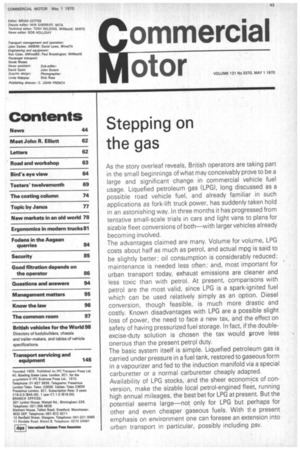Stepping on the gas
Page 45

If you've noticed an error in this article please click here to report it so we can fix it.
As the story overleaf reveals, British operators are taking part in the small beginnings of what may conceivably prove to be a large and significant change in commercial vehicle fuel usage. Liquefied petroleum gas (LPG), long discussed as a possible road vehicle fuel, and already familiar in such applications as fork-lift truck power, has suddenly taken hold in an astonishing way. In three months it has progressed from tentative small-scale trials in cars and light vans to plans for sizable fleet conversions of both—with larger vehicles already becoming involved.
The advantages claimed are many. Volume for volume, LPG costs about half as much as petrol, and actual mpg is said to be slightly better oil consumption is considerably reduced; maintenance is needed less often: and, most important for urban transport today, exhaust emissions are cleaner and less toxic than with petrol. At present comparisons with petrol are the most valid, since LPG is a spark-ignited fuel which can be used relatively simply as an option. Diesel conversion, though feasible, is much more drastic and costly. Known disadvantages with LPG are a possible slight loss of power, the need to face a new tax, and the effect on safety of having pressurized fuel storage. In fact, if the doubleexcise-duty solution is chosen the tax would prove less onerous than the present petrol duty.
The basic system itself is simple. Liquefied petroleum gas is carried under pressure in a fuel tank, restored to gaseous form in a vapourizer and fed to the induction manifold via a special carburetter or a normal carburetter cheaply adapted.
Availability of LPG stocks, and the sheer economics of conversion, make the sizable local petrol-engined fleet, running high annual mileages, the best bet for LPG at present. But the potential seems large—not only for LPG but perhaps for other and even cheaper gaseous fuels. With the present emphasis on environment one can foresee an extension into urban transport in particular, possibly including psv.
















































































































































































































